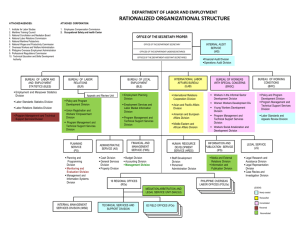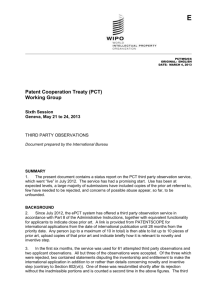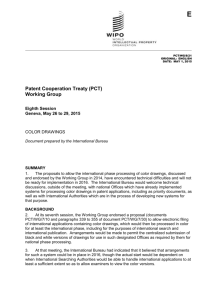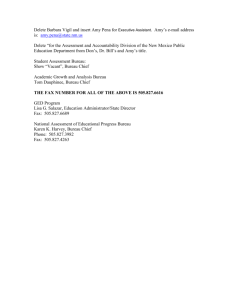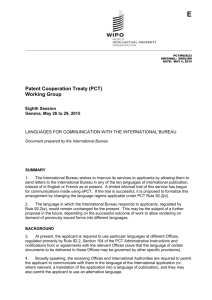PCT/WG/7/25
advertisement
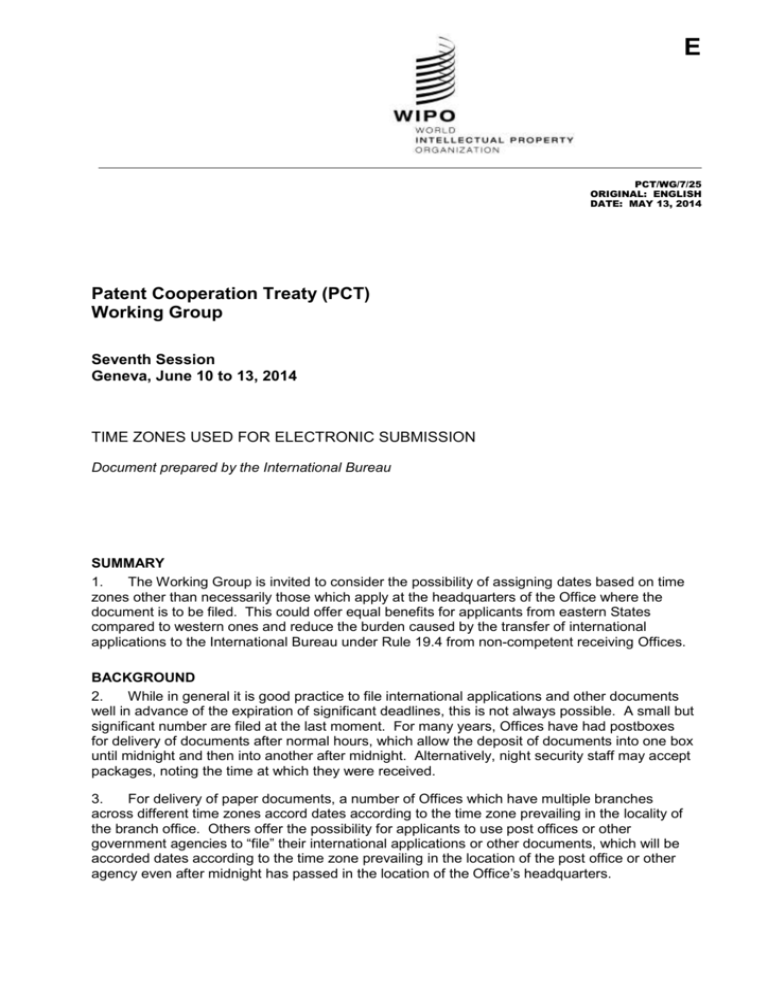
E PCT/WG/7/25 ORIGINAL: ENGLISH DATE: MAY 13, 2014 Patent Cooperation Treaty (PCT) Working Group Seventh Session Geneva, June 10 to 13, 2014 TIME ZONES USED FOR ELECTRONIC SUBMISSION Document prepared by the International Bureau SUMMARY 1. The Working Group is invited to consider the possibility of assigning dates based on time zones other than necessarily those which apply at the headquarters of the Office where the document is to be filed. This could offer equal benefits for applicants from eastern States compared to western ones and reduce the burden caused by the transfer of international applications to the International Bureau under Rule 19.4 from non-competent receiving Offices. BACKGROUND 2. While in general it is good practice to file international applications and other documents well in advance of the expiration of significant deadlines, this is not always possible. A small but significant number are filed at the last moment. For many years, Offices have had postboxes for delivery of documents after normal hours, which allow the deposit of documents into one box until midnight and then into another after midnight. Alternatively, night security staff may accept packages, noting the time at which they were received. 3. For delivery of paper documents, a number of Offices which have multiple branches across different time zones accord dates according to the time zone prevailing in the locality of the branch office. Others offer the possibility for applicants to use post offices or other government agencies to “file” their international applications or other documents, which will be accorded dates according to the time zone prevailing in the location of the post office or other agency even after midnight has passed in the location of the Office’s headquarters. PCT/WG/7/25 page 2 4. For delivery of electronic documents, most Offices currently apply dates according to the time zone prevailing at their headquarters. Electronic communications are now used for around 90 per cent of international applications and a large proportion of fee payments and submissions of post-filing documents. Consequently, applicants and third parties are able to secure delivery of documents essentially instantaneously to an Office from anywhere in the world. 5. The International Bureau and a significant number of national and regional Offices are competent as receiving Offices to act for nationals and residents of countries spread across multiple time zones. In this respect, applicants living in the western-most regions or States have an advantage over those in eastern regions or States if deposits are being made at an Office using their local time zone. 6. If they have missed a deadline according to the time zone at their local Office, an applicant can today file by fax or electronically to a more “westerly” Office. The extent to which this actually occurs is not clear, but it is notable that around 1200 applications per year are transferred under Rule 19.4 to the International Bureau as receiving Office, over half of which come from the United States Patent and Trademark Office (USPTO – one of the most westerly receiving Offices). A sizeable proportion of these applications need to be transferred because the applicant does not have the right to file to the receiving Office in question, though this can happen for reasons other than that the filing is being made from a different country. 7. This legal possibility offers the opportunity for applicants in “eastern” countries to take advantage of the same filing dates as those which are available at the same time to applicants in “western” countries provided that they are aware of the possibility. However, it comes with a considerable procedural burden to the Offices concerned. Rule 19.4 transfers are complicated for the International Bureau and the original receiving Office and cause major delays in transmission of the search copy to the International Searching Authority, which is detrimental to third parties as well as applicants and the Offices concerned. 8. Although filing from an “eastern” country to an Office applying a more “westerly” time zone might be seen as exploiting the system, it can also be seen as equalizing the opportunities available at a particular instant for applicants irrespective of where they reside. In any case, it would be essentially impossible to prevent without removing the opportunity to transfer an international application from a non-competent receiving Office to the receiving Office of the International Bureau. This would be undesirable since it would remove an important safeguard for applicants who file at a non-competent receiving Office either by accident or because they faced unavoidable obstacles to filing at their national Office. POSSIBILITIES TO CONSIDER 9. It may be desirable to recognize that opportunities already exist to obtain international filing dates and dates of receipt of documents to which time limits apply based on westerly time zones and regulate this so that opportunities apply equally to all applicants and, to the extent relevant, third parties. 10. Four main options can be envisaged: (a) No change – Offices continue to apply all dates based on the time prevailing at the location of the office where a document is received, or the headquarters location for electronic filing. PCT/WG/7/25 page 3 (b) Set a westerly time zone specifically for the International Bureau and receiving Office of the International Bureau – The International Bureau could use the time zone either based on its branch office in New York, or else (likely requiring legal changes) from western North America. Other Offices would be unaffected. This would potentially benefit all PCT applicants by giving all of them access to a single, advantageous time zone for filing. (c) Allow all Offices to select a time zone which applies within the region for whose residents they are competent to act as receiving Office – Under this arrangement, IP Australia (based in Canberra, on the eastern side of Australia) might choose to offer dates based on Perth time (2 hours different) and the International Bureau might offer dates based on a time zone from western North America. (d) All Offices in their PCT capacities apply the same westerly time zone – National Offices in eastern States would usually apply PCT dates one day behind those which applied at the time in their locality. 11. Within these options, it could be envisaged either to apply the same dates for all modes of filing (paper, fax or electronic), or else to limit the variation specifically to electronic filings. 12. There may be particular benefit in discussion of option (c), above, and its application only to electronic filings. The benefits of this are: (a) The issues are much less relevant to paper filings since they can only be made either by post (usually delivered once or twice per day, during normal Office hours) or else in person by someone resident in the same city as the Office. (b) Like electronic communications, faxes can be sent from anywhere in the world at any time of day, but are low quality transmissions which frequently cause more work than paper or electronic filings and it is not desirable to provide additional incentives to use this mode of filing. (c) The option for all Offices to provide more westerly time zones within the borders of their State or the States for which they act allows them to give “same day” benefits to all their residents without causing confusion by ever giving dates which are different to headquarters time within normal working hours. It would also provide a system which could sensibly be used with consistent effect for national applications. (d) The option for the International Bureau to base its operations on a western time zone would reduce the work caused by use of the USPTO as a receiving Office in situations where it is not competent, without introducing any real changes in the options available to applicants. ISSUES TO CONSIDER Location of Servers 13. The International Bureau considers that any such arrangement should not depend on there being a server physically located within the relevant time zone. Given the potential for using hosting services on sites far removed from a headquarters building, this could have arbitrary and unfortunate effects. 14. For example, the International Bureau maintains redundant servers on different sites to increase availability of services in the event of systems failure on one site. At present, these sites happen all to be in the same time zone as the headquarters in Geneva. However, consideration is being given to hosting some services on different continents to further reduce the risk of loss of service and to improve worldwide performance. The applicant may not have any direct choice of which server is used. Moreover, having different dates and times applied PCT/WG/7/25 page 4 simultaneously by two different servers being used by the same Office in the same role could cause significant anomalies in processing. It would be essential for the International Bureau to maintain a common time between servers which were performing common activities, irrespective of their location. 15. In addition, the International Bureau currently hosts a filing server in Geneva for IP Australia in its capacity as receiving Office and has offered to do so for other receiving Offices. In this case, the hosted servers are currently set to the time zone of the Office headquarters. It would be strange if an Office was permitted to offer an advantageous time zone solely on the basis of hosting its servers with the International Bureau, an arrangement which is intended merely to allow all Offices to offer equivalent standards of service but otherwise to be transparent to users. Equally, it would be unfortunate if Offices of States to the west of Geneva felt unable to use this service because they would then be required to apply the less advantageous Geneva time to their electronic filings. Dates of Documents Issued by an Office 16. Depending on the option selected and the details of the Rules and Administrative Instructions to implement them, changes to the means by which the dates of receipt of international applications and other documents are calculated might also affect the dates on which documents issued by an Office were considered to be mailed or transmitted. However, this would probably not be relevant in practice since the only situation where it might apply to work done during normal Office hours would be in the case of documents produced by the International Bureau in the early morning and in fact, at present, almost all mail is produced as a batch process in the early evening. Patent Law Treaty 17. Any changes made to the PCT Regulations or Administrative Instructions would need to be considered by the PLT Assembly to decide whether they should also apply to the PLT. It would be desirable that any changes be ones which would also be acceptable to that Assembly. As noted in paragraph 12(c), above, the option set out in paragraph 10(c) would likely be acceptable since it would have no mandatory effect on Offices but would give them room to offer beneficial services to local applicants in States which cover multiple time zones. CHANGES TO THE LEGAL FRAMEWORK 18. No changes to the legal framework are proposed at this time. The detailed implications will be determined depending on the views of Contracting States in the Working Group. 19. However, it is likely that Rule 80.4 would require amendment to implement options (c) or (d) as set out in paragraph 10, above, and possibly also for option (b), at least in the event that the time zone selected was not one corresponding to a WIPO branch Office. There would probably also be minor consequential amendments elsewhere. 20. If limited to electronic filing, the details would likely be set out in a modification to Section 704 of the PCT Administrative Instructions with possible consequential modifications to cover the need for notification of relevant time zones. 21. The Working Group is invited to consider the issues set out in this document. [End of document]
